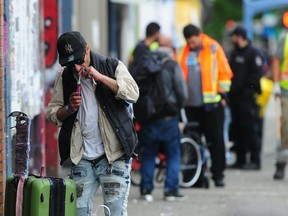Anyone who has driven or walked down East Hastings can tell you that the lax approach to drugs has only created more suffering

Article content
VANCOUVER — B.C. has decriminalized drug possession of 2.5 grams of cocaine, MDMA, meth and opioids, including heroin. Those in favour hail it as a victory against stigma, while opponents worry it will have unintended consequences. We will leave the public policy debate to others, but will ask another very pertinent question: what’s wrong with stigma?
Advertisement 2
Article content
We, as a society claim we don’t like to stigmatize or judge and say shame is bad. But this is to act foolishly: shame and stigma are how we show errant members of society that they need to reform their ways and change for the better. Looking around the world these days, one can’t help but feel that a little more shame would go a long way.
Article content
Despite shame and stigma’s positive restraint effect on many human urges, anyone with a desire to push through a “progressive change” for the alleged better will inevitably raise the negative spectre of stigma and shame in the face of opposition, often followed by raising the bedfellow of victim blaming. This, they feel, lends credence to their argument. The thought of shaming or stigmatizing someone will, so the social justice warrior hopes, compel a meek capitulation from their opponents, who ultimately seek not to be labelled regressive and heartless.
Advertisement 3
Article content
The notion that stigma is harmful to those hurting themselves or others is obviously disingenuous. Paradoxically, it is also its own form of shame and stigma. The difference is simply directional: progressive shaming confers virtue on those who mete it out for the right reasons, while regressive shame is the scorn poured on those who are uncomfortable with the idea that previously illegal or harmful activity should no longer be condemned.
We in B.C. have a drug problem to be sure. Opioid deaths are intolerably high. The people afflicted need support, but incredulity at the decriminalization approach should be taken more seriously than it currently is. Anyone in Vancouver who has driven or, God forbid, walked down East Hastings in our Downtown Eastside can tell you that the lax approach taken in recent years has only created more suffering.
Advertisement 4
Article content
The now godforsaken hell hole of human misery that the neighbourhood has become, has been a long slow slide that began with neglect and is fuelled by indifferent tolerance to drug abuse and crime. For years, politicians, most recently Vancouver’s former mayor Kennedy Stewart, have sought more allegedly progressive and less confrontational solutions to rampant drug use and addiction. The results are easily observable to any visitor to that area of town: tent-filled and garbage strewn streets of human suffering for blocks and blocks in Vancouver’s historic centre. All this, despite a price tag of $5 billion per year on social services. It’s not working and it’s hard to see how further decriminalization will improve the situation.
Advertisement 5
Article content
Indeed, if the non-response to the homeless (and drug) problem in other Vancouver neighbourhoods is any indication, it won’t. In 2020, a homeless encampment in the Strathcona neighbourhood that was left to fester ended with citizens attacked and newborn babies being threatened with rape and death with a stick. Call me old fashioned, but I’d like to stigmatize that kind of behaviour rather that pursue decriminalization.
-

FIRST READING: How drug decriminalization in B.C. could make everything worse
-

Colby Cosh: Ontario judge declares a right to build homeless camps on public land
“Decriminalization” or “following the science” are terms that have a sweet progressive ring and as such is the oft-favoured option for (non) action of politicians on the entire west coast. The problem is, the science proves very difficult indeed to follow, if it exists at all. Who can forget California’s effective decriminalization of theft under $950? How’s that working out? The shuttered doors of San Francisco shops scream a tale of woe, sorrow and business dreams shattered. The rampant drug use there is also no positive harbinger for Vancouver residents.
Advertisement 6
Article content
In Portland, following riots which torched and smashed the city in 2020, the police referred over 1,000 cases to the district attorney, which declined to prosecute over 70 per cent of them. Portland, a city once renowned for its cafés, breweries and nightlife is a hollow, unsafe shell of its former self.
It seems reasonable to ask if a little bit of good ol’ shame and stigma here wouldn’t help matters. Shame of stealing. Shame of vandalism. Shame of drug use. We don’t value these attributes as a society, so why no stigma? Were my daughter to behave in any of the above described ways, shame would be first on the list, followed immediately by stigma and repentance.
In writing that, I can hear the twitter elect sharpening their blades ready to pounce with murderous relish upon me and my ilk to hurl such opinions in the trash. They would, as it were, seek to shame me to more considerate, empathetic and politically acceptable opinions and behaviours. Shame, it would seem, is actually fine; it’s only the political direction of its application that makes it offensive.
National Post








